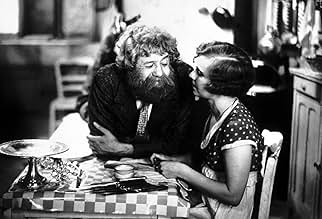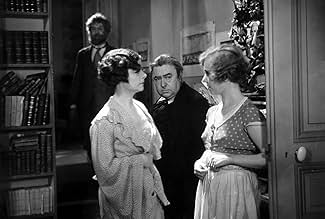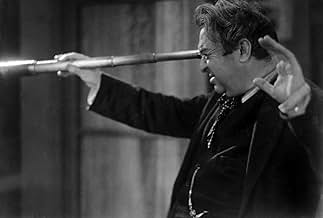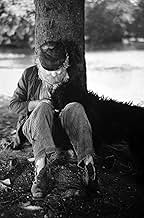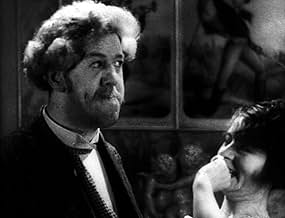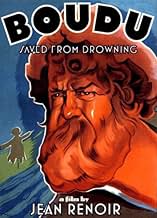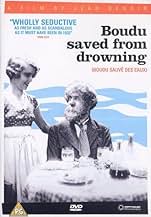Boudu sauvé des eaux
- 1932
- Tous publics
- 1h 25m
IMDb RATING
7.2/10
6.5K
YOUR RATING
A bookseller saves a tramp from drowning and shelters him, but the tramp's odd behavior starts to wear everyone down.A bookseller saves a tramp from drowning and shelters him, but the tramp's odd behavior starts to wear everyone down.A bookseller saves a tramp from drowning and shelters him, but the tramp's odd behavior starts to wear everyone down.
Charles Granval
- Édouard Lestingois
- (as Charles Granval de la Comédie Française)
Jacques Becker
- Le poète
- (uncredited)
Georges D'Arnoux
- Un invité à la noce
- (uncredited)
Régine Lutèce
- La promeneuse
- (uncredited)
Jane Pierson
- Rose, la voisine
- (uncredited)
- Director
- Writer
- All cast & crew
- Production, box office & more at IMDbPro
Featured reviews
While filmmaker Jean Renoir is usually considered among the most influential French directors of all time, it is common to find that discussions on his work tend to focus around his late 30s work, particularly in his movies "La Grande Illusion", "La Bête Humaine" and "La Règle Du Jeu". This is not really surprising, as those three are arguably Renoir's best films, however, while probably not as outstanding as those three, the rest of his work is of a consistent quality and of great importance for those interested in French cinema. This is specially true for his earlier movies, where Renoir was still developing his own technique and with it the style that would influence French cinema for generations. The 1932 comedy "Boudu Sauvé Des Eaux" is a perfect example of this, as while not really one of Renoir's best films, it is an enjoyable movie that is miles ahead most movies of its time.
"Boudu Sauvé Des Eaux", which literally means "Boudu Saved from the Water" is better known in English as ""Boudu saved from Drowning", as it is the tale of a tramp named Boudu (Michel Simon), who disenchanted with life after he loses his dog, decides to jump into the river Seine hoping to die. But Boudu's plan fails as he is saved by a gentle bookseller named Edouard Lestingois (Charles Granval), who after reviving him decides to "adopt" the tramp in his family, with the hope of making a good gentleman out of the bum. However, Boudu proves to be a difficult case, as with his lack of manners and wild anarchism shakes the lives of those living at Lestingois house, causing a mess everywhere becoming the terror of Lestingoi's wife Emma (Marcelle Hainia) and a source of constant frustration for Edouard Lestingois himself.
Based on a play by René Fauchois, "Boudu Sauvé Des Eaux" was adapted to the screen by Renoir himself and the then-newcomer Albert Valentin, whom certainly took advantage of the different possibilities that cinema offered to expand on the anarchic humor of the play. As one can imagine, the source of most of the movie's comedy lays in the social differences between Boudu and the Lestingoi family, making fun the bourgeois values of French society without mercy and surprisingly, void of any moralist stance. It is a very modern movie in this aspect, as without any pretensions or false sentimentalism (he makes sure of not making Boudu a hero) Renoir makes a poignant social commentary that is as clever as it's funny. The excellent development of his assortment of characters is the icing of the cake in what truly is one of Renoir's best screenplays among his early works.
As written above, in his adaptation of "Boudu Sauvé Des Eaux" director Jean Renoir looked for a more cinematic approach to the play, avoiding the use of sets almost completely and shooting on location as much as possible. This use of natural landscapes and real locations, together with Renoir's smooth and skillful camera-work create a sense of realism that later would become Renoir's trademark. Giving excellent use to Georges Asselin' cinematography, Renoir uses everyplace he can as a stage for his film, literally taking us along with Boudu in his adventure inside the Lestingois house. This wasn't the first time Renoir worked this way, but "Boudu Sauvé Des Eaux" was a further development of this style, a technique that would find its higher point in the three masterpieces he made later on that decade. While not one of his classics, many of Renoir's trademarks can already be seen here.
One of the elements that make "Boudu Sauvé Des Eaux" so enjoyable is definitely the acting, as everyone in the cast is simply excellent. The highlight is of course the legendary Michel Simon, who as Boudu, delivers one of the best and funniest performances in his career. With delightful malice and a good dose of cynicism, Simon makes Boudu a complex character that can go from being the most sympathetic antihero to the most despicable human being in seconds, and always without losing that charm that helps him to carry the film. As the Lestingois couple, Charles Granval and Marcelle Hainia are certainly playing caricatures, however, with extraordinary talent these two actors make the most of their characters, making them more complex and very vivid. Finally, Sévérine Lerczinska makes a terrific scene stealing performance that makes one wonder why did her career on film was so short.
While a harsh critique on the self-righteousness of the French bourgeoisie and the differences between classes (often compared to Chaplin's work), Renoir never intends this to be a moral lesson, as unlike what happens in Chaplin's films, neither Boudu is completely good nor Lestingois is completely bad. Instead of the classic "rich = bad, poor = noble" archetypes, "Boudu Sauvé Des Eaux" shows a very natural balance between both social classes, making fun of the clash of both without sentimentalism and with subtle malice, as if Renoir was stating that neither are exactly good. Even when "Boudu Sauvé Des Eaux" and its style of anarchic humor may look dated now, the movie is still very fun to watch. It isn't a masterpiece of cinema, but still holds up today, more than 70 years after its release.
Lighthearted but clever, "Boudu Sauvé Des Eaux" makes a nice introduction to the work of Jean Renoir as it has many of the elements that would become the basis of his work but under a simpler, friendlier facade. "Boudu Sauvé Des Eaux" may look a bit slow and dated nowadays, but it's still as valid as ever and an excellent example of French comedy of the 30s. A very recommended film. 8/10
"Boudu Sauvé Des Eaux", which literally means "Boudu Saved from the Water" is better known in English as ""Boudu saved from Drowning", as it is the tale of a tramp named Boudu (Michel Simon), who disenchanted with life after he loses his dog, decides to jump into the river Seine hoping to die. But Boudu's plan fails as he is saved by a gentle bookseller named Edouard Lestingois (Charles Granval), who after reviving him decides to "adopt" the tramp in his family, with the hope of making a good gentleman out of the bum. However, Boudu proves to be a difficult case, as with his lack of manners and wild anarchism shakes the lives of those living at Lestingois house, causing a mess everywhere becoming the terror of Lestingoi's wife Emma (Marcelle Hainia) and a source of constant frustration for Edouard Lestingois himself.
Based on a play by René Fauchois, "Boudu Sauvé Des Eaux" was adapted to the screen by Renoir himself and the then-newcomer Albert Valentin, whom certainly took advantage of the different possibilities that cinema offered to expand on the anarchic humor of the play. As one can imagine, the source of most of the movie's comedy lays in the social differences between Boudu and the Lestingoi family, making fun the bourgeois values of French society without mercy and surprisingly, void of any moralist stance. It is a very modern movie in this aspect, as without any pretensions or false sentimentalism (he makes sure of not making Boudu a hero) Renoir makes a poignant social commentary that is as clever as it's funny. The excellent development of his assortment of characters is the icing of the cake in what truly is one of Renoir's best screenplays among his early works.
As written above, in his adaptation of "Boudu Sauvé Des Eaux" director Jean Renoir looked for a more cinematic approach to the play, avoiding the use of sets almost completely and shooting on location as much as possible. This use of natural landscapes and real locations, together with Renoir's smooth and skillful camera-work create a sense of realism that later would become Renoir's trademark. Giving excellent use to Georges Asselin' cinematography, Renoir uses everyplace he can as a stage for his film, literally taking us along with Boudu in his adventure inside the Lestingois house. This wasn't the first time Renoir worked this way, but "Boudu Sauvé Des Eaux" was a further development of this style, a technique that would find its higher point in the three masterpieces he made later on that decade. While not one of his classics, many of Renoir's trademarks can already be seen here.
One of the elements that make "Boudu Sauvé Des Eaux" so enjoyable is definitely the acting, as everyone in the cast is simply excellent. The highlight is of course the legendary Michel Simon, who as Boudu, delivers one of the best and funniest performances in his career. With delightful malice and a good dose of cynicism, Simon makes Boudu a complex character that can go from being the most sympathetic antihero to the most despicable human being in seconds, and always without losing that charm that helps him to carry the film. As the Lestingois couple, Charles Granval and Marcelle Hainia are certainly playing caricatures, however, with extraordinary talent these two actors make the most of their characters, making them more complex and very vivid. Finally, Sévérine Lerczinska makes a terrific scene stealing performance that makes one wonder why did her career on film was so short.
While a harsh critique on the self-righteousness of the French bourgeoisie and the differences between classes (often compared to Chaplin's work), Renoir never intends this to be a moral lesson, as unlike what happens in Chaplin's films, neither Boudu is completely good nor Lestingois is completely bad. Instead of the classic "rich = bad, poor = noble" archetypes, "Boudu Sauvé Des Eaux" shows a very natural balance between both social classes, making fun of the clash of both without sentimentalism and with subtle malice, as if Renoir was stating that neither are exactly good. Even when "Boudu Sauvé Des Eaux" and its style of anarchic humor may look dated now, the movie is still very fun to watch. It isn't a masterpiece of cinema, but still holds up today, more than 70 years after its release.
Lighthearted but clever, "Boudu Sauvé Des Eaux" makes a nice introduction to the work of Jean Renoir as it has many of the elements that would become the basis of his work but under a simpler, friendlier facade. "Boudu Sauvé Des Eaux" may look a bit slow and dated nowadays, but it's still as valid as ever and an excellent example of French comedy of the 30s. A very recommended film. 8/10
Boudu Saved from Drowning (1932)
** 1/2 (out of 4)
A wealthy man saves a homeless guy from drowning and then takes him into his home where the bum soon starts to seduce his wife and mistress. As Jim stated earlier I too prefer the remake Down and Out in Beverly Hills. I think the biggest problem with this film is that the homeless guy is such a jerk it's hard to really care about him and he does the dumbest things that just seem so over the top that I couldn't laugh at him either. Halfway through the movie I was wishing the rich guy had let him drown so that the movie would have already been over.
** 1/2 (out of 4)
A wealthy man saves a homeless guy from drowning and then takes him into his home where the bum soon starts to seduce his wife and mistress. As Jim stated earlier I too prefer the remake Down and Out in Beverly Hills. I think the biggest problem with this film is that the homeless guy is such a jerk it's hard to really care about him and he does the dumbest things that just seem so over the top that I couldn't laugh at him either. Halfway through the movie I was wishing the rich guy had let him drown so that the movie would have already been over.
This is a difficult film to review succinctly. I didn't really enjoy it, but the film is well-made, well acted, and the underlying message is still poignant. At the time, "Boudu Saved from Drowning" was quite controversial, with Michel Simon's portrayal of the antisocial, uncompromised tramp (Boudu) inciting audiences to actual riot. (In fact, the film was apparently pulled from theaters by French police several days into its screening). Essentially, "Boudu Saved from Drowning" is an attack on liberalism, as well as a sort of black satire about societal class differences. Through their interaction with Boudu, a stereotypical Burgeouise family showcase the consequences of liberal idealism, as their efforts to help and reform Boudu all backfire unpredictably. Boudu is an irredeemable, unchangeable, and uncompromised outsider and he is happy as such. In the words of Jean Renoir, "...Micheal Simon was more than a tramp. He was the personification of all tramps." In other words, the lower class. Michel Simon does a great job with the part and the Boudu character is memorable. However, the rest of the characters are unlikeable (e.g. a perverse, overweight philanderer; his unabashed housekeeper mistress, a caustic wife, etc.) and the film's narrative is just, well, stuffy. I'd probably appreciate a film like this much more at 60 than I do at 30. For a film from 1931, "Boudu" does seem pretty fresh and the print looks terrific. Nonetheless, I didn't find "Boudu" very engaging. I can't recommend this one. ---|--- Reviews by Flak Magnet
I really enjoy watching old Michel Simon films. When I find one of his films, I always QUICKLY grab it and watch it as soon as possible. That's because even if the film isn't that great, his performance is always very interesting and quite unusual. My favorite film of his is Drôle de drame (1937), but he did several others that are among my favorites.
Well, once again Simon's performance makes this film worth watching. While in this case his acting is NOT subtle or perhaps as high quality as he's done in other films (it's a bit over-the-top), it's fun to just turn off your mind and watch the silliness. This film will not change your life and is a pretty insignificant film but still good to watch nonetheless. I think, for me, the reason I didn't enjoy the film more is that the character of Boudu is a pretty awful person and I just couldn't buy that he was such a sexual dynamo that he was able to make these women forget how crude, selfish and disgusting he was just by turning on the old libido!
So my verdict is that this is a good film that you can watch only if you suspend disbelief. Oh, and I forgot to mention, director Renoir did a great job on the film. For a 1931 French film, the sound and camera work are superb--something you DON'T see in many other films from this country until the later 1930s--he was truly ahead of his time.
Well, once again Simon's performance makes this film worth watching. While in this case his acting is NOT subtle or perhaps as high quality as he's done in other films (it's a bit over-the-top), it's fun to just turn off your mind and watch the silliness. This film will not change your life and is a pretty insignificant film but still good to watch nonetheless. I think, for me, the reason I didn't enjoy the film more is that the character of Boudu is a pretty awful person and I just couldn't buy that he was such a sexual dynamo that he was able to make these women forget how crude, selfish and disgusting he was just by turning on the old libido!
So my verdict is that this is a good film that you can watch only if you suspend disbelief. Oh, and I forgot to mention, director Renoir did a great job on the film. For a 1931 French film, the sound and camera work are superb--something you DON'T see in many other films from this country until the later 1930s--he was truly ahead of his time.
..sorry from the river.but it's important to bear in mind that Boudu is a metamorphosis of Legrand,the hero of Renoir's precedent work "la chienne" ,who became a tramp at the end of that movie.And like Nana in Renoir's eponymous silent movie adapted from Zola,he rose from the waters ("sauvé des eaux" is the exact meaning of the name "Mosis")to shake the well meaning bourgeoisie.A bourgeoisie where a piano is in the house because you must have one even if you do not play the piano. Almost thirty years before Luis Bunuel ("Viridiana" 1961) ,Renoir denounces the bourgeois charity ,which is a great weight off our guilty minds.Boudu is revolutionary,like Moliere's "Tartuffe" ,he squeezes Lestingois dry,but he knows from the start he will not be part of them .He refuses conventions,marriage is the worst of them all.These final sequences ,where Renoir made the best use of "blue Danube" I know (with Kubrik's "2001",but in a diametrically opposite way),are the key of the movie.Boudu looks like,at the end of the movie, like some distant cousin of Charlie Chaplin ,but a Chaplin who would have discovered cynicism.
Needless to say,"Boudu" would not be "Boudu" without Michel Simon's extraordinary presence.Such an actor does not exist anymore in French contemporary cinema.And his filmography is full of treasures.To think that he also worked with Duvivier,Carné,Clair,Decoin and so many more..
Remakes "down and out in Beverly Hills" with Nick Nolte and Bette Middler. "Boudu" ,by Gérard Jugnot,this very year. Are they necessary?
Needless to say,"Boudu" would not be "Boudu" without Michel Simon's extraordinary presence.Such an actor does not exist anymore in French contemporary cinema.And his filmography is full of treasures.To think that he also worked with Duvivier,Carné,Clair,Decoin and so many more..
Remakes "down and out in Beverly Hills" with Nick Nolte and Bette Middler. "Boudu" ,by Gérard Jugnot,this very year. Are they necessary?
Did you know
- TriviaFrench audiences were outraged by Boudu's antisocial behavior to the extent that police had to be called to several theaters to restore order. In some areas the film was immediately pulled because of its polarizing effect.
- Quotes
Chloë Anne Marie, la bonne: Why have a piano if no one plays it?
Édouard Lestingois: Even so, we have a piano because we are respectable people.
- Alternate versionsThere is an Italian DVD edition of this movie, distributed by DNA Srl. The movie was re-edited with the contribution of the film history scholar Riccardo Cusin. This version is also available in streaming on some platforms. This DVD also contains another movie by Jean Renoir: Toni (1935).
- ConnectionsEdited into Histoire(s) du cinéma: Seul le cinéma (1994)
- SoundtracksGénérique
Performed by Raphaël
- How long is Boudu Saved from Drowning?Powered by Alexa
Details
- Release date
- Country of origin
- Language
- Also known as
- Boudu Saved from Drowning
- Filming locations
- Berges de la Seine, Paris, France(Exterior)
- Production companies
- See more company credits at IMDbPro
Box office
- Gross worldwide
- $2,805
- Runtime
- 1h 25m(85 min)
- Color
- Aspect ratio
- 1.19 : 1
Contribute to this page
Suggest an edit or add missing content

